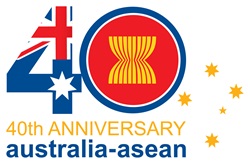
DFAT
Posted 21/07/2014 by Frank Frost
This year, Australia and the Association of Southeast Asian Nations (ASEAN) are marking 40 years of multilateral relations. The anniversary will culminate in a leaders’ summit in November in Nai Pyi Taw, Myanmar (the current Chair of ASEAN).
Since its inauguration in 1967, ASEAN has gradually extended its activities and is pursuing the development of an ASEAN Community by the end of 2015 in the areas of economic, political and security and socio-cultural cooperation. In April 1974 Australia became the first non-member country to establish a multilateral association with ASEAN. Australia has since cooperated with ASEAN in a number of areas including the Cambodia peace process (late 1980s–1993) and the development of the ASEAN Regional Forum (ARF, 1994, with 27 participants) and the East Asia Summit (EAS, 2005, which includes the ASEAN ten, Australia, China, India, Japan, Republic of Korea, New Zealand, Russia and the United States). Australia along with New Zealand concluded a multilateral Free Trade Agreement with ASEAN, inaugurated in 2008. Australia is also participating in negotiations on a further trade and economic agreement, the Regional Comprehensive Economic Partnership (RCEP, with ASEAN, China, India, Japan, New Zealand and the Republic of Korea).
Australia’s interactions with ASEAN are wide-ranging. In 2007, the two sides signed the Joint Declaration on the ASEAN-Australia Comprehensive Partnership: the Plan of Action to implement the Partnership provides a framework for the pursuit of relations. Australia’s Foreign Minister meets with ASEAN counterparts for annual consultations. Australia appointed a resident Ambassador to ASEAN (based in Jakarta) in September 2013. Australia also participates in several ASEAN-sponsored dialogues including the ARF, the EAS, a meeting of defence ministers (the ASEAN Defence Ministers Meeting Plus process) and a dialogue on maritime issues (the Expanded ASEAN Maritime Forum). Australia’s merchandise trade with the ten ASEAN members amounted to A$70.2 billion in 2013 (13.9 per cent of Australia’s overall trade). The multilateral Free Trade Agreement provides a significant framework for developing trade relations, although a report by Asialink in 2012 argued that more could be done to spread awareness of the agreement among business sectors. Australia’s bilateral development assistance to ASEAN members exceeds A$900 million in 2014–15. The ASEAN-Australia Development Cooperation Program supports ASEAN on a multilateral basis with a particular focus on assistance to ASEAN’s Secretariat in Jakarta and to ASEAN’s programs for economic integration. Alongside official cooperation, people-to-people and educational links are very extensive: for example, between 2002 and 2012, there were 614,327 enrolments by students from ASEAN countries in Australian tertiary institutions.
The Minister for Foreign Affairs Julie Bishop emphasised the Government’s commitment to ASEAN in an article in April 2014. Ms Bishop commended ASEAN’s contribution to economic growth, to regional security dialogue and architecture and to promoting cooperation on disaster relief. Australia’s current cooperation priorities include developing the New Colombo Plan (which is being trialled in Indonesia, Singapore, Japan and Hong Kong), strengthening cooperation through the East Asia Summit and supporting the work of the ASEAN Coordinating Centre for Humanitarian Assistance on disaster management (AHA Centre).
Australia appreciates ASEAN’s ongoing contributions to regional security. Australia has accordingly supported ASEAN’s objectives in seeking to conclude with China a ‘code of conduct’ for the South China Sea. A code could potentially facilitate more cooperative relations among parties with competing territorial claims, reduce the dangers of maritime incidents or clashes and improve coordination of resource management and environmental protection. However, while discussions between ASEAN and China have continued, recent disputes (including between China and both the Philippines and Vietnam) have added to regional tensions and reduced prospects for progress towards a possible code of conduct.
In 2014, the Australia-ASEAN anniversary is being promoted through a program of events. These include a Business Forum, visits to Australia by the ASEAN Secretary-General and other senior ASEAN officials, and an ASEAN-Australia Connectivity workshop, along with regular ministerial meetings with ASEAN by the Foreign Minister and the Minister for Trade.
Anniversary celebrations will culminate in a special leaders’ Commemorative Summit in Myanmar in November 2014. This will be the fourth ASEAN-Australia Summit at heads of government level, after similar meetings in 1977, 2004 (along with New Zealand) and 2010. At the November Summit, ASEAN and Australia are expected to adopt a new Plan of Action for the period 2015–2019 to deepen political and security, economic and people-to-people cooperation. Discussion is also likely on whether Australia and ASEAN could meet more frequently at heads of government level than has occurred in the past. Such meetings could be held every two to three years and would help add focus and profile to the relationship on both sides.